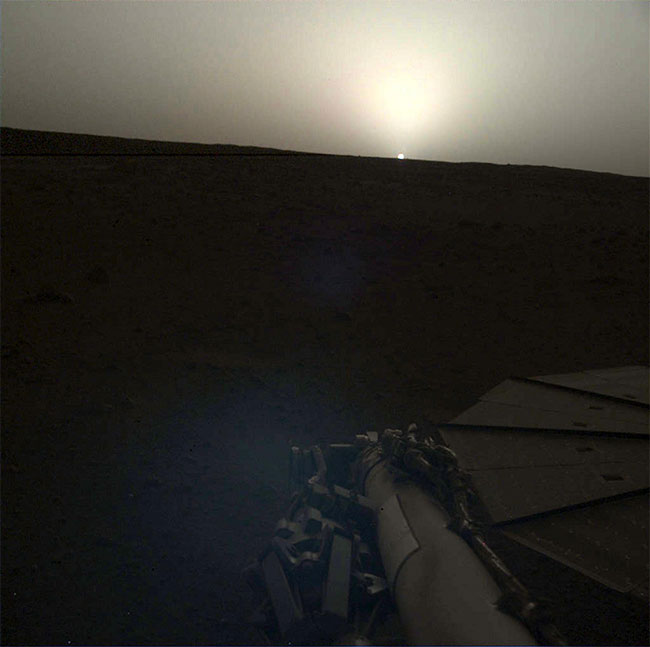InSight probes capture sunrise and sunset on Mars
The Mars probe InSight of the US Aerospace Agency (NASA) has provided us with interesting details about the Red Planet, including the weather, sunrise and sunset here.
CNN said on May 1 that the InSight probe used a robotic arm camera to capture sunrise and sunset photos at 5:30 and 18:30 on 24 and 25 April (Martian hour).

The camera on InSight's robotic arm captures the sunrise on Mars on April 25 - (Photo: NASA).
At the same time, another camera captures the image of clouds in the sky when the sunset falls on the Red planet.
From the point of view on Mars, the Sun is especially small because of the distance to Mars further to our Earth. That, according to NASA, means that the Sun we see on Mars is about two-thirds the size of Earth.
According to Justin Maki, a team of investigators and photographers in NASA's InSight project, sunrise and sunset photography is the "tradition" of ships on Mars missions.

Camera on InSight's robotic arm captures the sunset on Mars on April 25 - (Photo: NASA).
The Viking 1 lander once took a picture of sunset on Mars in August 1976. Viking 2 photographed the sunrise in June 1978. Spirit, Opportunity and Curiosity probes used to capture sunrise and sunset on Red Planet.
"When our basic photography tasks have been completed, we decided to capture the sunrise and sunset scenes from another world," said Maki.
Recently InSight has also discovered the first earthquake on Mars.
- InSight probes successfully landed on the surface of Mars, a new era has just opened
- NASA explorer ship landed on Mars, sending the first picture to Earth
- NASA's seven-minute scare is about to land on Mars
- NASA landing gear gains strange pulses on Mars
- Blue sunset on Mars surface
- NASA probe landed Mars to find out the origin of Earth
- Want to send your name to Mars? NASA will help!
- NASA broke into the moment the InSight probe landed on Mars successfully
- Learn about sunrise and sunset
- America will put more robots on Mars
- Mars is about to welcome guests from the United States
- NASA announced the first recording of the earthquake on Mars
 Announced 3 houses on the Moon and Mars
Announced 3 houses on the Moon and Mars Science proves: Mars also knows 'deflated'
Science proves: Mars also knows 'deflated' Elon Musk announced the price for a Mars trip was 11.6 billion VND, free of charge
Elon Musk announced the price for a Mars trip was 11.6 billion VND, free of charge NASA discovered strange 'gate' on Mars, is the hiding place found?
NASA discovered strange 'gate' on Mars, is the hiding place found?